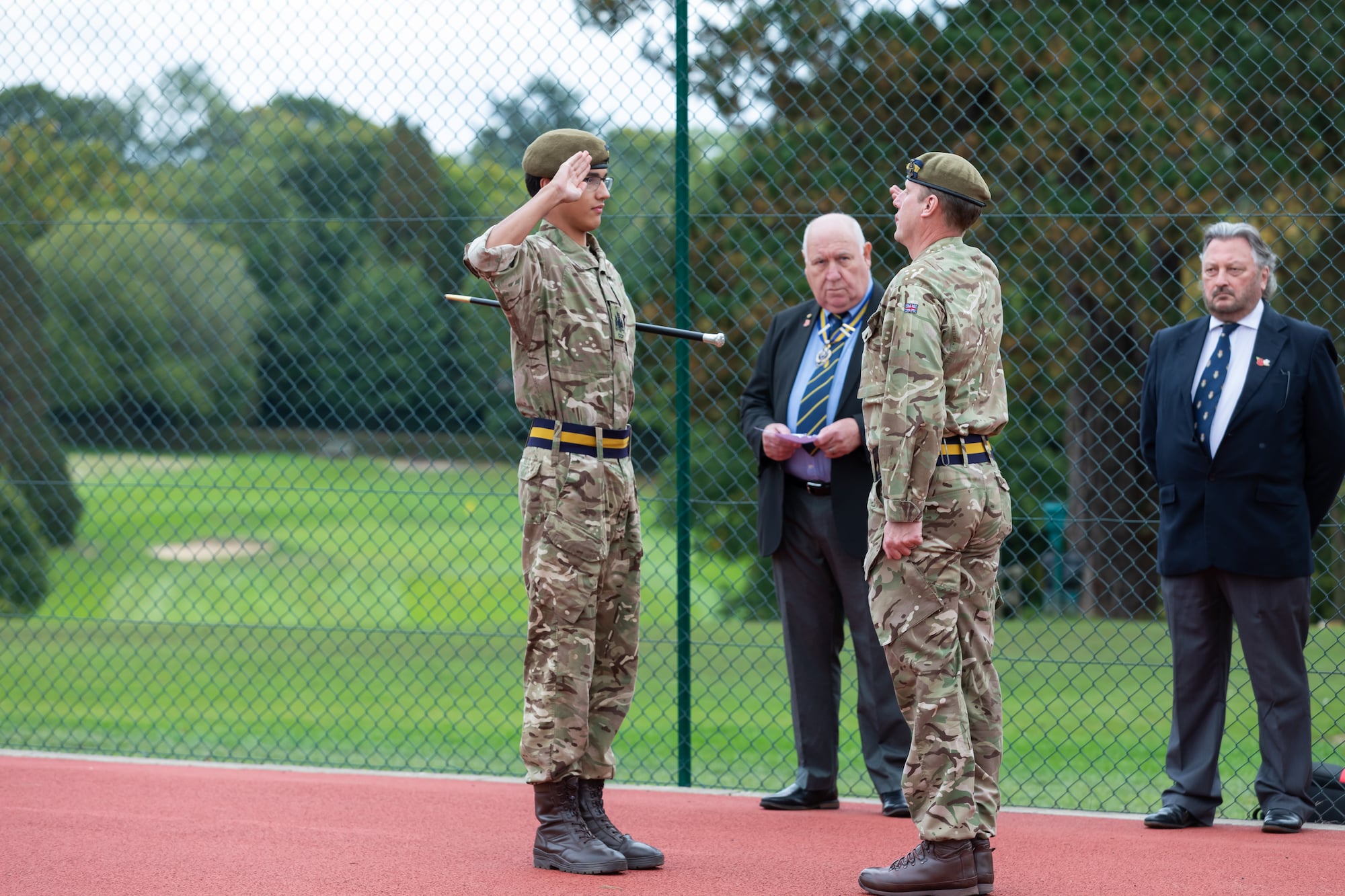 There has always been room for truly serious drama at Cranleigh and it doesn’t get more serious than ‘Ghosts’. It is right that at an educational establishment such landmarks in the history of literature should be produced, as well as lighter entertainments. Perhaps the clinching validation of this compelling production, directed with a wealth of experience and literary and historical awareness by Martin Allison, was a conversation I had the next day with an UVth Former. For many adults even if, to my shame, like me, they had never read or seen this famous play, the one thing they know is that it is about inherited syphilis. Ibsen uses phrases such as “worm-eaten at birth” so that an innocent audience today might not get the point. But my attentive and perceptive Year 11 interlocutor was well aware that Osvald had inherited ‘a thing in the brain’, as well as the actual debauched behaviour of Captain Alving. And he seemed aware also of how another taboo subject, incest, was not just part of the plot (Osvald loves his half-sister Regina) but also hinted at in the powerful passion of son for mother. The director’s programme notes wisely pointed us to how Ibsen anticipates ‘Freud’s examination of the power of guilt to stultify and distort the life of the individual’.
There has always been room for truly serious drama at Cranleigh and it doesn’t get more serious than ‘Ghosts’. It is right that at an educational establishment such landmarks in the history of literature should be produced, as well as lighter entertainments. Perhaps the clinching validation of this compelling production, directed with a wealth of experience and literary and historical awareness by Martin Allison, was a conversation I had the next day with an UVth Former. For many adults even if, to my shame, like me, they had never read or seen this famous play, the one thing they know is that it is about inherited syphilis. Ibsen uses phrases such as “worm-eaten at birth” so that an innocent audience today might not get the point. But my attentive and perceptive Year 11 interlocutor was well aware that Osvald had inherited ‘a thing in the brain’, as well as the actual debauched behaviour of Captain Alving. And he seemed aware also of how another taboo subject, incest, was not just part of the plot (Osvald loves his half-sister Regina) but also hinted at in the powerful passion of son for mother. The director’s programme notes wisely pointed us to how Ibsen anticipates ‘Freud’s examination of the power of guilt to stultify and distort the life of the individual’.
Regina was played by Emma Collier, who captured movingly the terror of possibly having to leave the home of the free-thinking Mrs Alving, where she has been educated and in which she symbolically sips champagne with her ‘betters’, for the home of the villainous Engstrand, whom she believes to be her father. His plan to use her as a ‘bit of skirt’ to attract higher class drinkers to his proposed hostelry is one of many moments where Ibsen’s abhorrence at the treatment of women in European society is made clear.
 As Engstrand Barnaby Findlay used voice, stance, expression and gesture to embody the bullying, blackmailing drunk whose maleness (he does not deserve the word masculinity) stands as an opposite to the ‘Ewigweibliche’ with brains that we see in Regina and Mrs Alving. That he will, in a sense, replace the burned-down orphanage with his Sailors’ Home, a brothel in all but name, adds further to the cycle of entrapment that the play’s title suggests.
As Engstrand Barnaby Findlay used voice, stance, expression and gesture to embody the bullying, blackmailing drunk whose maleness (he does not deserve the word masculinity) stands as an opposite to the ‘Ewigweibliche’ with brains that we see in Regina and Mrs Alving. That he will, in a sense, replace the burned-down orphanage with his Sailors’ Home, a brothel in all but name, adds further to the cycle of entrapment that the play’s title suggests.
Tommy Lyster’s Pastor Manders was a terrifying study in hypocrisy. The plastered-down hair seemed symbolic of the oleaginous character and, although this monster of outward respectability might have been a secular character, one senses a justified outrage in Ibsen about how the church’s power and tradition can collude in watering and sustaining the sins of man, so that at the end of the play it is the sun, not the Son, that offers a possibility, however remote, of redemption. Many young actors can give a carefully crafted sense of an older character but Tommy seemed to be able to do it from within, as if there was a volcano of putrid matter under the sober black clothes. The blocking allowed us to see the Pastor in relation to the dead hypocrite himself, Captain Alving, through the portrait in oils that crowned a carefully conceived set, with props to match. Among these were Mrs Alving’s books which the director’s programme notes helpfully highlighted. Martin Allison referred to Marx, and Mill as well as Darwin, the volume handled by the Pastor as if it were animal dung. A sneaky look in the interval elicited the fact that the other two used on set were ‘Zadig’ by Voltaire (‘Candide’ might have been too obvious a link, I suppose), and a volume by Ruskin: Osvald is a painter.
 Mara Walters gave the performance of her life as Mrs Alving. Her eyes seemed to be able to convey intellectual confidence and emotional guilt at the same time and she seemed to use the adrenalin we all feel when acting under lights to fuel the character’s bewilderingly complex feelings. Her big speeches: “I sit here fighting with ghosts”; “we are all ghosts”; conveyed that great theme that Miller and others were to take from Ibsen: the power of the past over the present. There was, rightly, no need for crude make-up to age Mara: the way she moved and her vocal acting conveyed her suffering at the hands of her dissolute, syphilitic and alcoholic husband. Her heroic sacrifice in sending away her son at the age of seven has taken its toll and this is cruelly underlined when she realise Osvald too has the first symptoms of tertiary syphilis. Her heroic defiance of the Pastor over her books is also undermined, but by the end, as the sun of dawn streams through, her earlier line “I must find my own way to freedom” offers a new choice: the heroism of helping Osvald to die by the morphine or the heroism of trying to find some hope in a hopeless world.
Mara Walters gave the performance of her life as Mrs Alving. Her eyes seemed to be able to convey intellectual confidence and emotional guilt at the same time and she seemed to use the adrenalin we all feel when acting under lights to fuel the character’s bewilderingly complex feelings. Her big speeches: “I sit here fighting with ghosts”; “we are all ghosts”; conveyed that great theme that Miller and others were to take from Ibsen: the power of the past over the present. There was, rightly, no need for crude make-up to age Mara: the way she moved and her vocal acting conveyed her suffering at the hands of her dissolute, syphilitic and alcoholic husband. Her heroic sacrifice in sending away her son at the age of seven has taken its toll and this is cruelly underlined when she realise Osvald too has the first symptoms of tertiary syphilis. Her heroic defiance of the Pastor over her books is also undermined, but by the end, as the sun of dawn streams through, her earlier line “I must find my own way to freedom” offers a new choice: the heroism of helping Osvald to die by the morphine or the heroism of trying to find some hope in a hopeless world.
Jon Oldfield was perfect for the young artist Osvald: he has the vulnerability and freshness to draw the audience’s sympathy and also the intelligence to suggest an older man’s experience. He shares his mother’s desire for “the joy of life” (the temptation to have his paintings on set to illustrate this was wisely resisted) but has inherited from his father a destructive pull towards depravity along with his disease. Yet he has seemingly lived a moral life, despite the Pastor’s condemnation of illegal marriage, and has learned from bohemian communities in Southern Europe a realisation that, as his mother puts it, “law and order causes all the unhappiness in the world.” And even when describing the horrors of his illness, knowing that blindness and paralysis awaits him, Osvald finds something beautiful in the concept of the softening of the brain: as if this artist is an image of the playwright himself, creating something lasting and inspiring from a plot which, in summary, is as bleakly pessimistic as could be imagined.
 The whole theatrical experience was utterly engrossing: the VCT allows an intimacy and a naturalistic projection of the voice that can draw an audience of all ages into a shared journey. The quality of silence itself was testament to the power of the play and the direction. Martin Allison also has a rare gift not to over-use music: the atmospheric snatches of Gorecki, Britten and Schoenberg and the organ music especially recorded by Philip Scriven created, supported and sustained the atmosphere as did the moody lighting of Mark Jenkins. The final effect of sun through the window is very important and seemed to me to catch the necessary ambiguity: the hope tempered by the imprisoning dark bars of shade. Robin Lailey’s wonderful photography of Norway and the director’s programme notes both added significantly to the richness of our understanding.
The whole theatrical experience was utterly engrossing: the VCT allows an intimacy and a naturalistic projection of the voice that can draw an audience of all ages into a shared journey. The quality of silence itself was testament to the power of the play and the direction. Martin Allison also has a rare gift not to over-use music: the atmospheric snatches of Gorecki, Britten and Schoenberg and the organ music especially recorded by Philip Scriven created, supported and sustained the atmosphere as did the moody lighting of Mark Jenkins. The final effect of sun through the window is very important and seemed to me to catch the necessary ambiguity: the hope tempered by the imprisoning dark bars of shade. Robin Lailey’s wonderful photography of Norway and the director’s programme notes both added significantly to the richness of our understanding.
The applause at the end was, of course, loud and warm but the lack of hysterical whooping reflected a theatrical experience that was salted and sobered by this long night’s journey into day. Many were moved to tears, for me it was, as Wordsworth put it, a case of ‘Thoughts that do often lie too deep for tears’.
PJL
Back to all news











